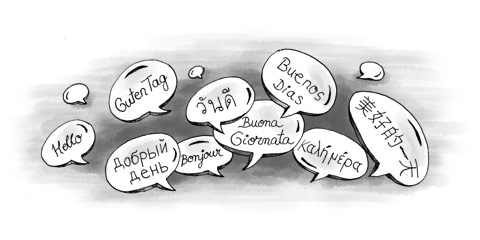When visiting Belgium, you will notice that most people speak English. Not only youngsters, but also adults have a good knowledge of English.
However there is still quite a difference between the Flemish and French regions when it comes to English fluency: Flemish people tend to speak better English than French people. But no matter where you are in the country, you will feel a lot more comfortable if you speak the local language.
The good thing is, there is no need to learn both Dutch and French, as your business and social life will be in the language of the region where you choose to live. There are many Belgians that only practice one of the local languages.
Dutch/Flemish
Dutch (or Flemish) belongs in the first category of languages. This means that this language is closely related to English and will this be easier to learn for anyone that speaks English.
If you already know a language such as French, Spanish, Italian or even Portugese, you will see that a lot of words are similar to Dutch words.
A difficult thing about learning Dutch is the tenses. In many cases the vowels in the past tense are different than in the present tense. This means that pronunciation also changes, which can be very confusing. For example ‘ik loop’ which means ‘I run’, will become ‘ik liep’ in the past.
This brings us to the hardest thing about learning Dutch: the pronunciation. Some consonants like ‘ch’, ‘sch’, ‘ng’ and ‘nk’ that are often used in the Dutch language are uncommon in other languages. Also, vowels such as ‘ui’ and ‘eu’ are vowels most people have never heard of before.
You can reach reading and speaking proficiency in Dutch within half a year of intense study (approximately 575-600 hours). If you want to take it more slowly and a basic level (A1 - A2) is enough for you, this will take approximately 200 hours or a couple of months.
You may only need a basic level for certain jobs but some will require a higher level.
French
Just like Dutch, French also belongs in the category of easiest languages to learn. When you start learning it, you will likely recognize many words from English: it has been estimated that a third of the words in the English language come from French.
Just as with Dutch, many people struggle with tenses when learning French. French verbs are divided into 3 different groups (verbs ending on -ER, -IR and -RE), each with their own set of rules for conjugation.
A difference that stands out from English is that every French noun has a gender. They are either masculine or feminine and it is not always obvious what gender belongs to a word.
Despite these small hurdles, it is possible to become fluent in French within only half a year of intensive study. If you don’t have the time for an intensive study, it is possible to reach a basic level (A1 - A2) after a couple of months if you practice 1 or 2 times per week.
Employers usually require a basic level of the local language, but this also depends on the type of job.
Language schools
The best way to learn either Dutch or French is to sign up for a course at a language school. Classes are divided into the following categories:
- extensive 4 - 10 hours per week
- intensive 15 - 20 hours per week
- total immersion 20 - 40 hours per week
Prices can range from a few hundred euros per week to several thousand for a total immersion course.
Useful tips
- watch Belgian TV with subtitles
- listen to the Belgian radio
- read children’s books
- talk to people and pretend that you don’t speak English



